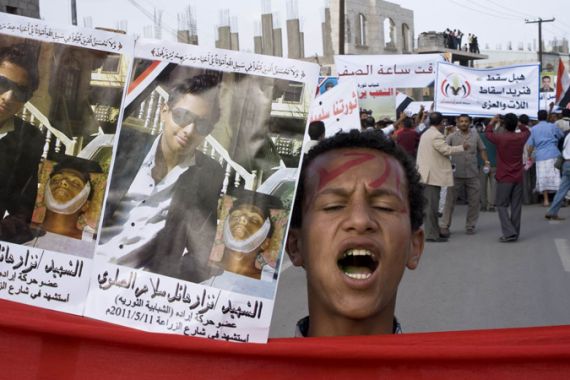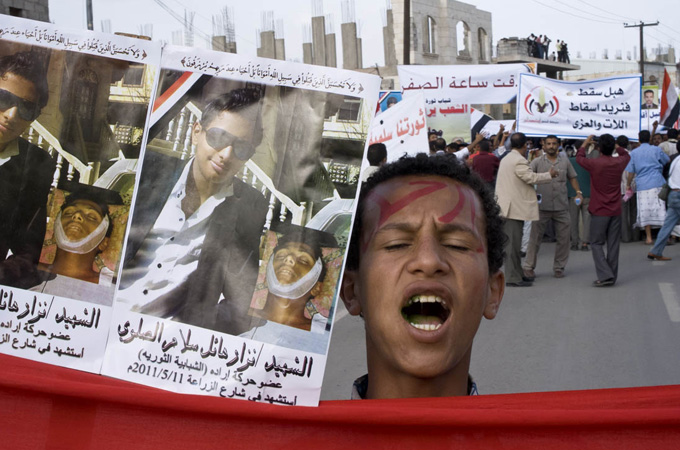Protests in Yemen after talks rejected
Thousands gather outside vice-president’s residence after official says no dialogue can take place until Saleh returns.

Yemen’s government has rejected an offer from the Joint Meeting Parties (JMP), the country’s umbrella opposition group, for talks about a political transition.
A high-ranking government source said no dialogue can take place until Ali Abdullah Saleh, the president, returns to Yemen following medical treatment in Saudi Arabia.
The response spurred on thousands of protesters to gather in front of the residence of Abdu-Rabbu Mansour Hadi, the vice-president, on Tuesday, demanding the acting leader form a transitional council.
“The people want to form a transitional council, we will not sleep, we will not sit until the council is formed,” the protesters chanted.
The demonstrators called for a”million-man march” for Saleh to stay in Saudi Arabia, where he has been treated for injuries since an attack on his palace on Friday.
Protests continued on Wednesday, though Yemeni soldiers cleared tents that demonstrators had set up outside Hadi’s residence.
 |
Hadi was tasked with running the government after Saleh left for Saudi Arabia earlier this week, following a rocket attack on his compound that left him seriously wounded.
A source close to Saleh dismissed the JMP’s offer as “ridiculous”, and said no political dialogue could take place until Saleh returned. “Saleh is still the president of Yemen,” the source said.
“The answer of the government was … that Saleh remains the ultimate constitutional authority of the government … So basically, they are telling them ‘sorry, we are not going to talk about it’,” Al Jazeera’s Hashem Ahelbarra said about the government’s response.
“[The opposition is] under tremendous pressure from the thousands of pro-democracy activists across the country to take a very aggressive role and jump in, reinforcing a new agenda in Yemen.
“If they fail to do that, definitely, they will lose more support in Yemen.”
Taiz stormed
Meanwhile, tribesmen and army troops clashed near the presidential palace in Yemen’s second-largest city, Taiz on Tuesday.
A shell fired by a tank near the palace landed in a nearby residential area – killing four people, including three children, according to the Associated Press.
Armed groups backed by the opposition and local tribes have deployed in large parts of Taiz to protect installations and neighbourhoods after security forces vanished two days ago, residents said.
“I consider Taiz to have fallen under the control of the dissidents,” Sheikh Hammoud Saeed al-Mikhlafi, head of the tribal council in Taiz, told the AFP news agency by telephone.
That was a sentiment echoed by security officials, who told AP that hundreds of armed tribesmen had taken control of part of the city, and that things were quiet there on Wednesday morning.
Fighting also raged between Yemeni troops and suspected al-Qaeda gunmen at the gates of Zinjibar, the southern city which had earlier fallen under the group’s control.
Yemen’s military said it had killed 30 of the group’s fighters on Tuesday, including a local al-Qaeda leader.
Saleh injuries
Saleh is believed to have undergone surgery to remove shrapnel from his chest, with his injuries reportedly more serious than earlier thought.
 |
| Thousands protested in Sanaa on Tuesday [Luke Somers] |
US officials said he had suffered burns to over 40 per cent of his body, as well as bleeding inside his skull.
Dr Bob Arnot, a journalist and medical doctor, told Al Jazeera that in his opinion, given the current information, Saleh should not be allowed to leave hospital “for a month or so”.
“The only thing I would be really concerned about is the bleeding inside his brain … if that expanded, or destroyed any of the white matter, that is what could harm him potentially to speak, or carry out the duties of a president.”
On Wednesday, a senior Yemeni diplomat in Saudi Arabia said Saleh’s condition was “very good”.
“I visited him yesterday evening and he was good. He talked to us and asked about the Yemeni expatriates and he is better than the others who were injured. He is very good and talks. He was sitting on a chair,” said Taha al-Hemyari, head of Yemeni Community Affairs at the Riyadh embassy.
“Maybe within the next hours the supervising doctor will release a statement about his condition.”
Hadi said on Monday that Saleh’s health was improving and that he “would return to the homeland in the coming days”, but medical sources said he would need at least two weeks to recover in Saudi Arabia.
Yemen’s prime minister, his two deputies, the heads of the two houses of parliament and the head of the ruling party bloc in parliament were all evacuated to Saudi Arabia along with Saleh after the blast at his palace.
International pressure
Gerald Feierstein, the US ambassador to Yemen, met Hadi on Monday, the US state department said.
Elsewhere, US and European leaders have called for Saleh to hand over power to a new leader.
William Hague, the British foreign minister, called on Tuesday for Yemen to begin an immediate political transition.
“The situation in Yemen is extremely uncertain following President Saleh’s departure to Saudi Arabia … We urge the vice president to work closely with all sides to implement the Gulf Co-operation Council agreement and to begin political transition now,” he said.
Hillary Clinton, the US secretary of state, said on Monday: “We think an immediate transition is in the best interests of the Yemeni people”.
For her part, Catherine Ashton, the European Union’s foreign policy chief, said she hoped Saleh would let his country “move on” while he sought medical treatment in Saudi Arabia.
More than 450 people have been killed in the unrest that has shaken the nation of 23 million since late January.